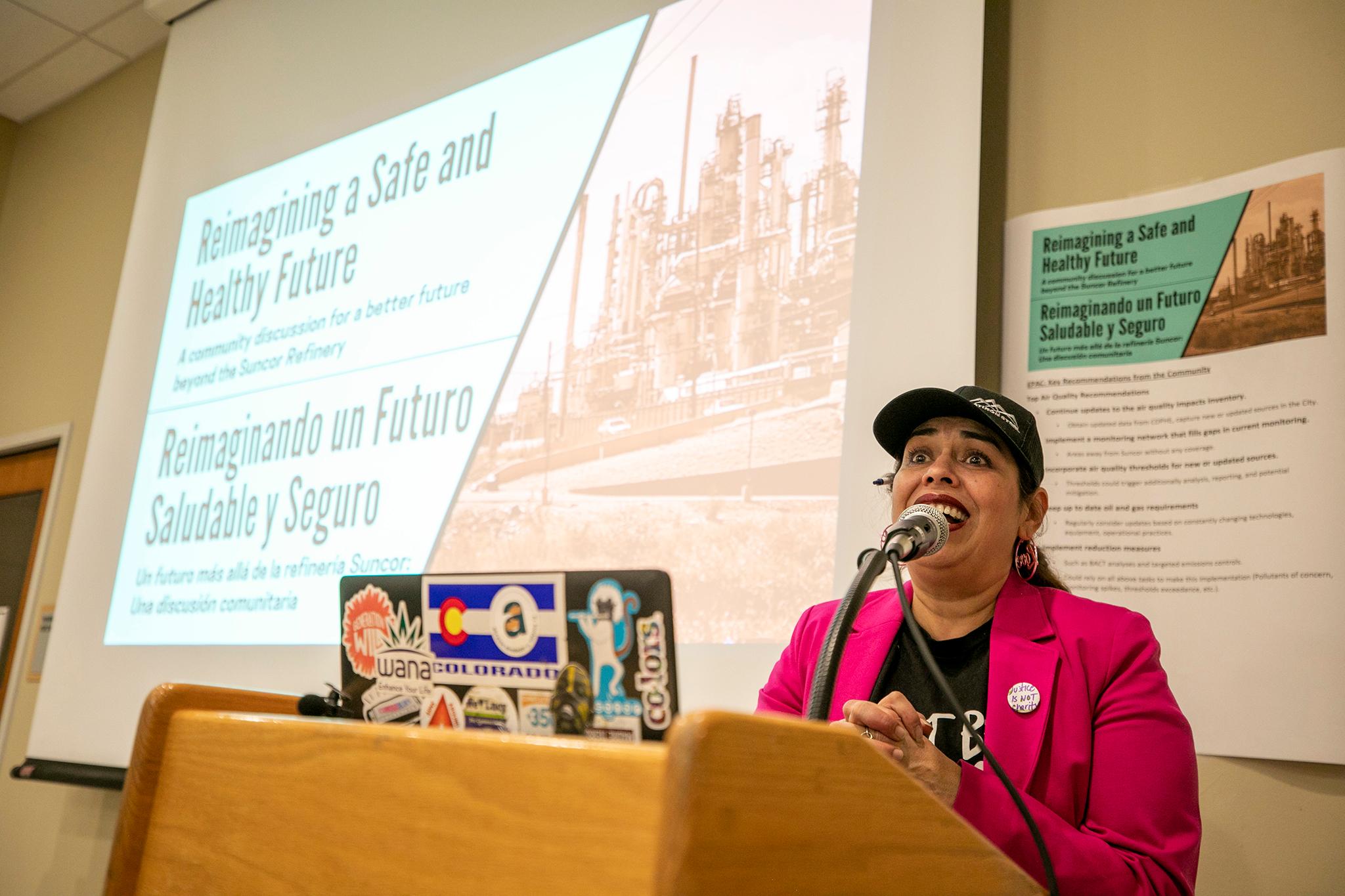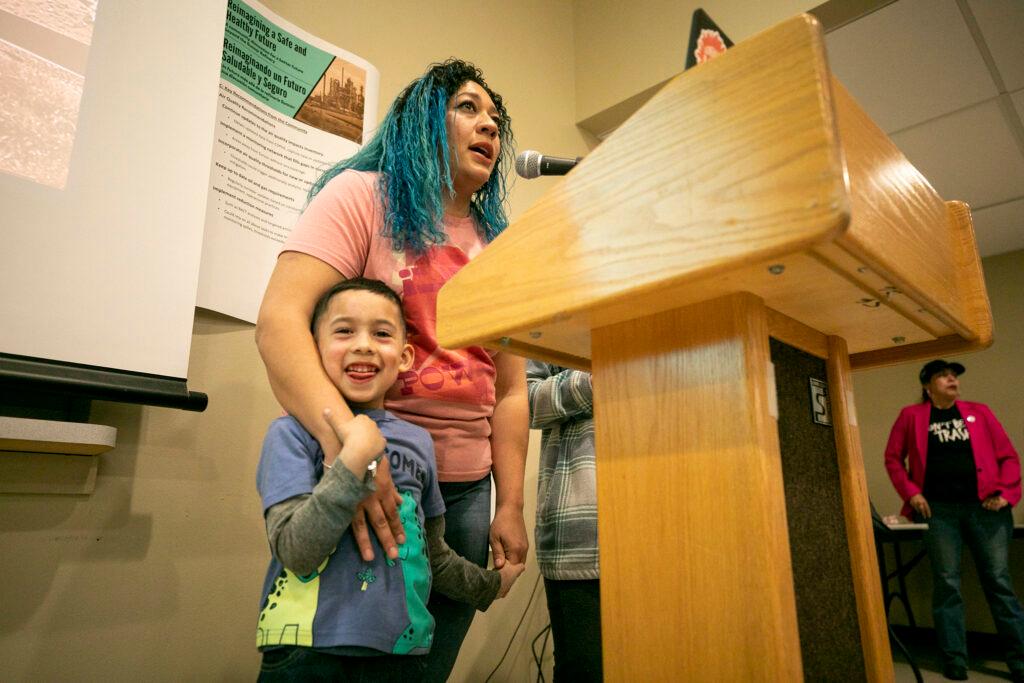
Suncor Energy, a Canadian oil and gas company, has nearly resumed full operations at its Commerce City refinery more than three months after a cold snap triggered a mysterious series of failures at the facility.
The restart already appears to have helped reduce fuel prices across Colorado, but the saga has frustrated residents of the less affluent, largely Latino neighborhoods surrounding the facility. In light of the recent fires and pollution incidents, some community and environmental groups have even demanded a plan to shutter the refinery for good.
"This community feels that we have been punished for their errors," said Lucy Molina, a Commerce City resident and frontline community organizer with 350 Colorado, an environmental advocacy group. "Our gas prices went up and there were still incidents during that shutdown. It is very unnerving."
At an event organized at a Commerce City recreation center, Molina and other environmental advocates called on residents to imagine a future without Colorado's only oil and gas refinery. Community members traded ideas about ways to build new green spaces and invest in clean energy jobs to assist with a "just transition" away from fossil fuels.
“There are so many options there for us that have never been offered or provided or accessible to communities like ours because we're poor and we're not worth it,” Molina said.
Suncor Energy, meanwhile, insists it paused operations to make repairs, which industry experts say signals the company plans to maintain a long-term presence in the community and protect public safety. That's led many critics to call for a more thorough accounting of what went wrong last December and why it led to releases of dangerous pollutants like benzene, hydrogen sulfide and sulfur dioxide.
A deep freeze leads to a shutdown.
The first sign of problems at the refinery came on Dec. 22. As temperatures plunged nearly 24 degrees at Denver International Airport, the company sent alerts saying it activated emergency teams and sounded alarms at the refinery before determining conditions were safe.
It turned out the company was struggling to handle a series of failures. Two days later, it called 911 to request an ambulance following a flash fire that sent two workers to the hospital with burns. One employee quickly returned to the job while another spent weeks recovering at home with undisclosed injuries.
A short time after the fire, Suncor announced the plant would close for three months to allow for repairs. The news meant Colorado would lose a facility that normally supplies 35 to 40 percent of all the gas and diesel consumed statewide.
Drivers quickly felt the impact at the pump. In late February, the price for an average gallon of regular gas in Colorado peaked at around $4.10 according to data from American Automobile Association, putting it well above the national average. The cost has since declined to about $3.56 per gallon. Skyler McKinley, a spokesperson for AAA Colorado, national economic trend can’t explain such a sharp drop in prices.
“That leads me to believe we are seeing Suncor supply back in the system,” McKinley said.
Loa Esquilin Garcia, a Suncor spokesperson, confirmed the refinery had restarted Plant 2 last Friday. She added the company would complete the startup process for Plant 1 “in the coming days,” which also produces gasoline and diesel, along with a third plant used to produce the majority of the asphalt consumed in Colorado.

Environmental groups have fought for a clear answer about what caused the original malfunctions.
In press statements, Garcia has only said the “extreme and record-setting weather” forced the company to place the refinery in “safe mode” to allow for inspections and repairs. Meanwhile, state air quality regulators say the problems started when a hydrogen plant “tripped” last December, which led to subsequent equipment shutdowns.
Ian Coghill, a senior attorney with Earthjustice, said the public should have more details months later. Otherwise, there’s no reassurance that similar problems will be avoided. “It’s really troubling,” Coghill said.
A document Suncor submitted to state air regulators last March likely contains the most detailed timeline of those events. It confirms the facility suffered from several malfunctions starting on Dec. 21, including fires and other problems that forced the company to enact emergency shutdown procedures.

John Jechura, a professor of practice at the Colorado School of Mines who worked in refineries, reviewed the document. While he’s glad the company made the decision to shut down the refinery, he said Suncor Energy should still explain events like a set of fires in a “sour water stripper” area on Dec. 27.
“That’s kinda weird,” Jechura said. “There isn't really a lot of detail to really figure out whether it was a big problem or not a big problem.”
In the same document, Suncor said it’s now investigating the incidents and plans to submit a full report to state regulators this summer.
Those malfunctions coincided with a long series of pollution incidents.
Since the problems started on Dec. 21, Suncor has filed a total of 75 reports with state air regulators acknowledging air pollution emissions above limits set in its state operating permits. That’s according to data compiled by Rosemarie Russo, an environmental planner with Commerce City.
A current point of debate is whether those releases have affected the surrounding neighborhood. In a statement, the company insisted that its own air monitors around the plant have not measured unsafe levels of pollution during the shutdown or the re-start. A state air monitor deployed to a park near the refinery also did not measure pollution levels above federal health standards.
Meanwhile, Cultivando, an local community nonprofit, said its own community air monitors tracked an increase in airborne benzene and other air pollutants during the shutdown period but acknowledges the rise could be related to other emission sources and normal winter weather conditions.
Other groups have tried other methods to track an emission from the facility. On a recent day just north of the Suncor plant, Andrew Klooster, a field advocate for EarthWorks, set up an $80,000 optical gas imaging camera to document any pollution coming from the plant. In the viewfinder, emissions appeared as plumes made of psychedelic colors wafting from the tops of tall smokestacks.
As it resumes normal operations, Klooster hopes to establish that the company is releasing pollution from specific unregulated sources under its state operating permit.
“What we've learned is that there's just a lot that's being missed,” Klooster said.
Funding for public media is at stake. Stand up and support what you value today.









